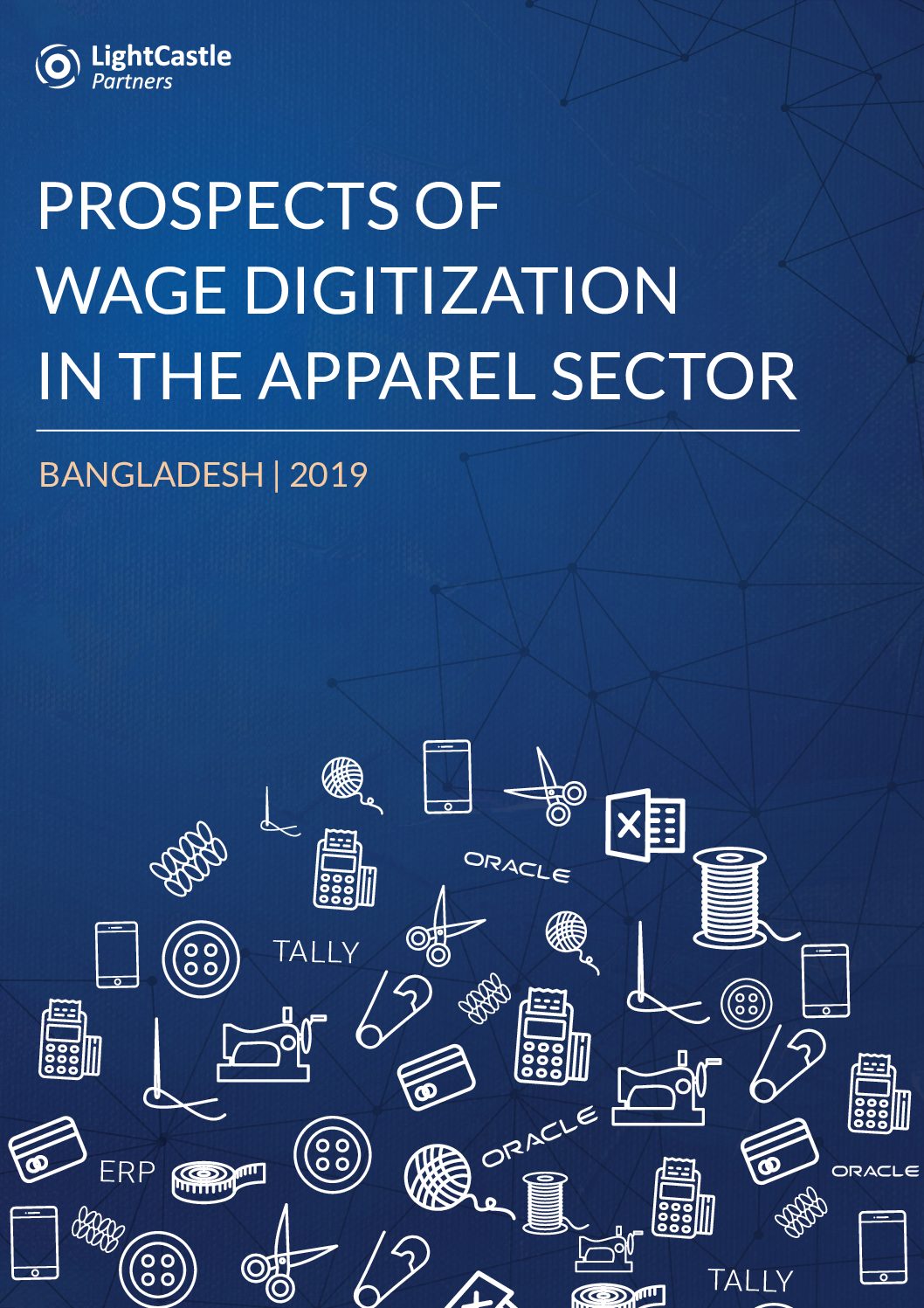GET IN TOUCH
- Please wait...

Bangladesh’s overall financial inclusion increased by 56.3% between 2011 to 2018, driven by strong policy support from the government, initiatives by the private sector, and involvement by the multilateral development partners. For equitable economic growth and poverty reduction, it is essential to increase access and usage of innovative financial products and services. Giving underprivileged groups financial access can open up a number of doors for faster economic growth and contribute to the achievement of significant sustainable development goals. With the view to understand how women’s economic empowerment can be bolstered by the uptake of Digital Financial Services (DFS) access and usage, LightCastle Partners, in collaboration with BRAC James P. Grant School of Public Health, signed a contract with the World Food Programme (WFP) and conducted a detailed study titled ‘Situation Analysis and Design Support for Enabling Digital Financial Inclusion and Women’s Economic Empowerment in urban and rural” for Vulnerable Women Benefit (VWB) Programme, implemented by the Ministry of Women & Children Affairs (MoWCA).
The consortium, led by LightCastle Partners, conducted the project in two phases whereby in the initial phase, the consortium partners comprehended the existing state of digital financial inclusion, vulnerable women group’s interest, and their ability to leverage DFS, including the potential challenges and opportunities. The second phase would mainly be centered on utilizing the findings and implementing the interventions through the creation of tools, providing training and capacity-building programmes or other short and long-term interventions, and a comprehensive guide to help integrate digital financial inclusion and support women’s economic empowerment through cash-transfer programmes.
Additionally, for this study, the consortium partners conducted 70+ Ethnographic case studies, 35+ Key Informant Interviews (KIIs), and 15 Focus Group Discussions (FGDs), to investigate various stakeholders’ perspectives of the digital financial ecosystem. A wide range of stakeholders was interviewed, including Financial Service Providers, NGOs, Mobile Network Operators (MNOs), and policymakers.
As per National Social Security Strategy (NSSS) the existing Vulnerable Group Development (VGD) programme will be transformed into VWB programme. Department of Women Affairs (DWA) and WFP are currently working together to select 1 million vulnerable women all over the country who will be receiving benefits from January 2023 onwards. Supported by the Bill and Melinda Gates Foundation (BMGF), in Bangladesh, WFP is closely working to identify methods for enhancing the impact of large-scale Government to Person (G2P) transfers on disadvantaged women. The VWB Programme’s overall aim is to ensure that the essential needs of these vulnerable women (including food and nutrition needs for themselves and their families) are provided. Additionally, this programme would also catalyze improving their resilience and overall livelihoods through the creation of a more accessible and enabling financial ecosystem, mainly through a digital cash transfer programme.
In line with the study goals, on the 25th of July, Ms. Farida Parvin, Director General of the Department of Women Affairs graced the validation workshop as the Chief Guest along with representatives of 15+ key stakeholder organizations such as government bodies, Think Tanks, Mobile Financial Service Providers, Financial Institutions, NGOs, Mobile Network Operators, Microfinance Institutions, and 40+ participants. LightCastle Partners and James P. Grant School of Public Health, BRAC University facilitated the event for the study. The workshop served as the first validation programme for the findings from phase one among the key ecosystem stakeholders.
Following comprehensive research, enablers, and barriers to the inclusion of vulnerable women in the digital financial ecosystem were identified in the presentation. Based on these findings, recommendations were developed to ensure the inclusion of vulnerable women groups, adding up to a total of 11 suggested interventions.
The workshop served as a forum for all of the key players in the ecosystem, where an open round-table discussion resulted in a comprehensive grasp of the current situation. Finding strategic interventions based on participant rankings was a key goal of the validation workshop. The expected outcome was a consolidated understanding of the recommendations that the ecosystem actors thought would work in the best interest of the vulnerable women groups.
According to the study findings and the key stakeholders present in the workshop, the successful development of Bangladesh’s G2P payment system is still hampered by the country’s pervasive “digital gap” between rural and urban households. However, having access to digital resources is only one of two components of digital literacy; the other is having the knowledge and abilities necessary to successfully utilize these technologies for communication, information-seeking, and problem-solving. Over the last few years, beneficiaries have improved their skills to some extent, however, there is still room for improvement, specifically, among vulnerable communities. Now the burning question is who should be involved to equip these vulnerable women groups with digital and technical literacy? The government and government bodies like Bangladesh Bank and ministries have several mandates and policies, but they do not have the bandwidth to train these beneficiaries at the grassroots level. Similarly, Financial and Non-Financial Institutions might have products targeted toward these vulnerable groups however, their end goal is to promote their products and services to the customers. This is where NGOs and MFIs can play a significant role with relevant support from the government bodies. According to the experts present at the workshop, it was suggested that we have to focus on the ‘teachable moments that will leave a real-time impact on the beneficiaries.
Additionally, it was also suggested that only cash-based programmes and reliefs will not be sufficient to make them empowered and financially included in the ecosystem. These social-security programmes need to be tied up with income-generating activities such as pension schemes, insurance schemes, innovative savings, and loan products and services which will help them utilize the funds in entrepreneurial activities and improve their living standards. Furthermore, it’s high time that grievance systems and customer protection policies are developed for vulnerable groups given their susceptibility to being deceived by unscrupulous ecosystem actors.
Side by side, male counterparts, and decision-makers at the household level also play a critical role in achieving women’s economic empowerment because, in our culture, they hold the majority of power in almost every aspect of life, from personal decisions about the family size to their day to day lifestyle and finances. Women are assigned the majority of reproductive responsibilities in Bangladesh’s patriarchal culture, and they face high workloads and unpaid labor, lack of decision-making in the household and society, and subordination, while gender-biased social expectations keep most women stuck in deprived circumstances. Thus, a behavior change component also needs to be ensured through awareness and sensitization according to the findings.
According to a Digital Expert from the United Nations Capital Development Fund (UNCDF) the digital ecosystem can be looked at through four pillars which are as follows:
Bangladesh has advanced in terms of gender-sensitive policies and regulations along with well-equipped infrastructure. However, there is still a lack of innovative products and services that are designed keeping in mind the needs of vulnerable women groups. Moreover, to ensure women’s economic empowerment skill development needs to be promoted at grassroots levels, whereby these women groups will be linked with entrepreneurial activities.
Another interesting suggestion was made by a think thank which involves the generation of unique IDs for all the citizens of Bangladesh. One drawback of the National Identification System (NID) is that it doesn’t account for people below the age of 18. Thus, the generation of a unique ID from the birth cycle of a citizen to various stages of their lives such as birth>education>vote>marriage>health>children>death will create a transparent data reservoir for the government, and this can be further linked to the financial accounts of the citizens and other platforms. This will expedite the process and ensure transparency in the ecosystem. Additionally, this will also help to eliminate the cost for the government once developed since the unique ID will be interconnected with multiple platforms and one single ID will serve multiple purposes.
Lastly, all the relevant stakeholders including mobile network operators, digital financial service providers, and mobile handset manufacturers need to make a concerted effort to promote the access and usage of digital products since there are certain challenges involved such as affordability to own and operate a phone, internet costs, cash-out charges, etc. for these vulnerable women groups.
As mentioned by the chief guest Ms. Farida Parvin, the way forward in creating an inclusive digital financial ecosystem for all the vulnerable women groups will work hand in hand by imparting financial and technological literacy, as well as eradicating social taboos. The validation workshop ultimately helped the research teams and WFP to zoom in on the top three recommendations.
The top three recommendations ranked by the participants were:
awareness and sensitization of beneficiaries and their family members to promote women’s participation in economic activities
Building digital capacity through an Integrated Support System will help equip vulnerable women with the necessary knowledge and technical assistance to access and utilize Digital Financial Services and design innovative digital financial products with the needs of vulnerable women in mind in order to facilitate access, adoption, and repeat usage among vulnerable groups. On the 3rd of August, a follow-up Strategy Consultation Session with representatives from different ministries was organized and the follow-up session looked to incorporate suggestions from different government institutions, with an explicit aim to ensure buy-in for the implementation phase. Phase two of the engagement plan will entail implementing the interventions through the VWB Programme.
Samiha Anwar, a Business Consultant at LightCastle Partners, has prepared the write-up. For further clarification, contact here: [email protected]
 |
If you are interested to learn about the Prospects of Wage Digitization in the Apparel Sector in Bangladesh
|
Our experts can help you solve your unique challenges
Stay up-to-date with our Thought Leadership and Insights